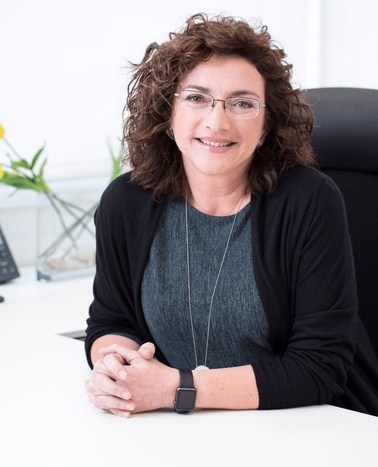
Cristina Simón
Cristina Simón is the Academic Director of the IE Brown Executive MBA and has over 20 years of experience in higher education. Currently, she’s an associate professor for Human Resources and Organizational Behavior, sharing her knowledge from her impressive career in management, her psychology degrees and her research with her students. Cristina uses this expertise to approach the reality of the business world, allowing her students to reflect on human resources with practical experience.
Passionate about her field, Cristina founded IE Business School’s Human Resources Center in 2003. A particular line of interest that fascinates her are employee relationships with their working context, including factors such as macroeconomic trends, the labor market and company and society values. Now working mainly in academia, Cristina maintains her relationship with the corporate world through IE University’s HR Benchmarking Club, where she regularly meets to share information and best practices in human resources.

"This program is very much focused on developing an awareness of the social complexities involved in every decision that executives make in their business."
HOW DID YOU END UP BECOMING A FACULTY MEMBER FOR THE IE BROWN EXECUTIVE MBA PROGRAM?
I have been teaching since the start of the program. When I was offered the position and discovered the program’s underlying philosophy, I was thrilled about the chance to merge business and humanities to expose executives to a wider business context to allow them to refine their decision-making. As a people management professor, this approach makes my classes much more interesting and enjoyable.
WHAT DO YOU ENJOY MOST ABOUT TEACHING THE IE BROWN EXECUTIVE MBA PROGRAM?
Although the students may look similar to the cohort of “traditional” Executive MBA programs based on years of experience, age or professional background, they are actually quite different as far as their approach to management discussions is concerned. They are still action-oriented but much more prone to reflection. We also have students coming from the arts that want to extend their professional scope from a business point of view. As a group, they are also more curious and interested in content that isn’t initially part of their daily management practice. For a professor, this attitude opens up a lot of possibilities to address topics in a different way, departing from the typical “recipe-like” methodology that students generally expect from MBA teaching.
WHAT SETS THE IE BROWN EXECUTIVE MBA PROGRAM APART FROM OTHER MBA PROGRAMS?
This program is very much focused on developing an awareness of the social complexities involved in every decision that executives make in their business. This fosters critical thinking and reflection skills for managers. Nowadays, both social complexities and reflective leadership are gaining more importance within organizations and involve the cooperation of faculty members of very different profiles. The IE Brown Executive MBA program integrates top professors from both institutions that complement each others’ knowledge base to provide students with a platform for discussing managerial topics from both humanities and social sciences perspectives.
WHAT IMPORTANT LESSONS HAVE YOU LEARNED THROUGHOUT YOUR CAREER THAT YOU’D LIKE TO SHARE WITH OTHERS?
As a social psychologist, I have learned to be intellectually humble and question everything. Humans are very complex, and so is everything that our societies create: cultures, institutions and systems. Business organizations are more overwhelmed than ever with such complexity and what has worked efficiently for the last 70 years, no longer applies. Given that organizations are very conservative in their internal cultures and processes, leaders have to drive change independently by reflecting on what is happening today; particularly in terms of impact over people and communities. To me, this is a matter of a permanent “awareness-reflection-revision-action” cycle, which students should practice intensively in their programs.
WHAT ADVICE WOULD YOU GIVE TO STUDENTS STARTING THE IE BROWN EXECUTIVE MBA PROGRAM?
I think the best recommendation is to keep an open mind to new content and discussions, and benefit from their studies with the flexibility and capacity to reflect on topics. Sessions are very open and given that the program is a 15-month part-time laboratory of decision-making in the light of different, divergent topics, it’s worthwhile to finetune their capacities as 21st century managers.